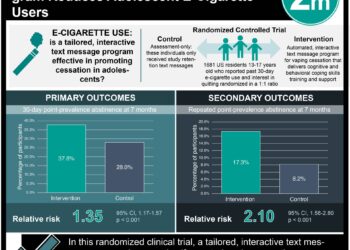Increased risk of hookah use in urban and high socioeconomic adolescents
1. Urban residence, high parental education, and high weekly job incomes (≥ $51) were all associated with increased hookah use in U.S. high school seniors.
2. Substance use increased risk of hookah use: history of alcohol use ever, marijuana use ever, and current regular cigarette smoking increased risk of hookah use three-, four- and five-fold, respectively.
Study Rundown: Hookah smoking has been linked to adverse health outcomes, including lung and esophageal cancer; however, hookah use continues to rise among adolescents in the U.S. Nearly 1 out of 5 U.S. high school adolescents have tried hookah before graduating. This cross-sectional study surveyed a random sampling of U.S. high school seniors to identify demographic, socioeconomic, and substance use predictors of hookah use. Among the 5540 students surveyed, 18% reported hookah use in the past year. Females and black students were less likely to have used hookah in the past year, while high parental education, a weekly job income of ≥ $51, and urban students were all more likely to report hookah use. Lifetime alcohol and marijuana use were associated with three and four times higher risk of hookah use, respectively, and current regular cigarette smoking increased hookah use five-fold. Though this study is limited by the omission of students who have dropped out prior to senior year of high school, it identifies specific predictors of hookah use in adolescents and highlights the need for physicians to better educate adolescent patients about hookah smoking.
Click to read the study published today in Pediatrics
Relevant Reading: Waterpipe tobacco and cigarette smoking: direct comparison of toxicant exposure
Study Author, Dr. Joseph J. Palamar, PhD, MPH, talks to 2 Minute Medicine: New York University Langone Medical Center, Department of Population Health.
“Medical students, residents and fellows need to be knowledgeable about the increasing popularity of hookah use among adolescents and young adults. They need to inform at-risk patients that use is unhealthy and not safer than cigarettes. However, on the same token, it is important that we don’t exaggerate the potential consequences associated with use. As social acceptance increases, it is important that we continue to provide patients with evidence-based information that is believable, and that will hopefully lead to informed decisions about use.”
In-Depth [cross-sectional study]: High school seniors from 48 states were surveyed from 2010 to 2012 as a part of the Monitoring the Future (MTF) study. Among the 5540 students, 48.6% were male and 62.6% were white. Females were less likely to report hookah use (adjusted odds ratio [aOR] = 0.81; 95% CI: 0.67-0.98), as were black students (aOR = 0.27; 95% CI: 0.17-0.41). High parental education (aOR = 1.58; 95% CI: 1.24-2.02) and weekly job income ≥ $51 (aOR = 1.26; 95% CI: 1.02-1.56) were both associated with increased hookah use. Small and large metropolitan statistical areas (MSA) were both associated with a greater than two-fold risk of hookah use. Use of alcohol (aOR = 3.34; 95% CI: 2.12-5.25), marijuana (aOR = 4.48; 95% CI: 3.38-5.94), and other illicit substances ever (aOR = 1.53; 95% CI: 1.22-1.92) all increased risk of hookah use. Students who had smoked cigarettes once or twice in the past were 2.22 (95% CI: 1.69-2.91) times more likely to have used hookah, while current smokers who smoked occasionally versus regularly were 4.19 (95% CI: 3.03-5.78) and 5.12 (95% CI: 3.61-7.26) times as likely to have used hookah, respectively.
More from this author: AAP recommends STI screening for adolescents and young adults; Adverse childhood experiences identified by low-income, urban young adults; Varicella vaccination not associated with increased adolescent disease burden; Filtered-sunlight may effectively treat neonatal jaundice in resource-poor settings; Delaying measles vaccination after 15 months may increase seizure risk
Image: PD
©2012-2014 2minutemedicine.com. All rights reserved. No works may be reproduced without expressed written consent from 2minutemedicine.com. Disclaimer: We present factual information directly from peer reviewed medical journals. No post should be construed as medical advice and is not intended as such by the authors, editors, staff or by 2minutemedicine.com. PLEASE SEE A HEALTHCARE PROVIDER IN YOUR AREA IF YOU SEEK MEDICAL ADVICE OF ANY SORT.







